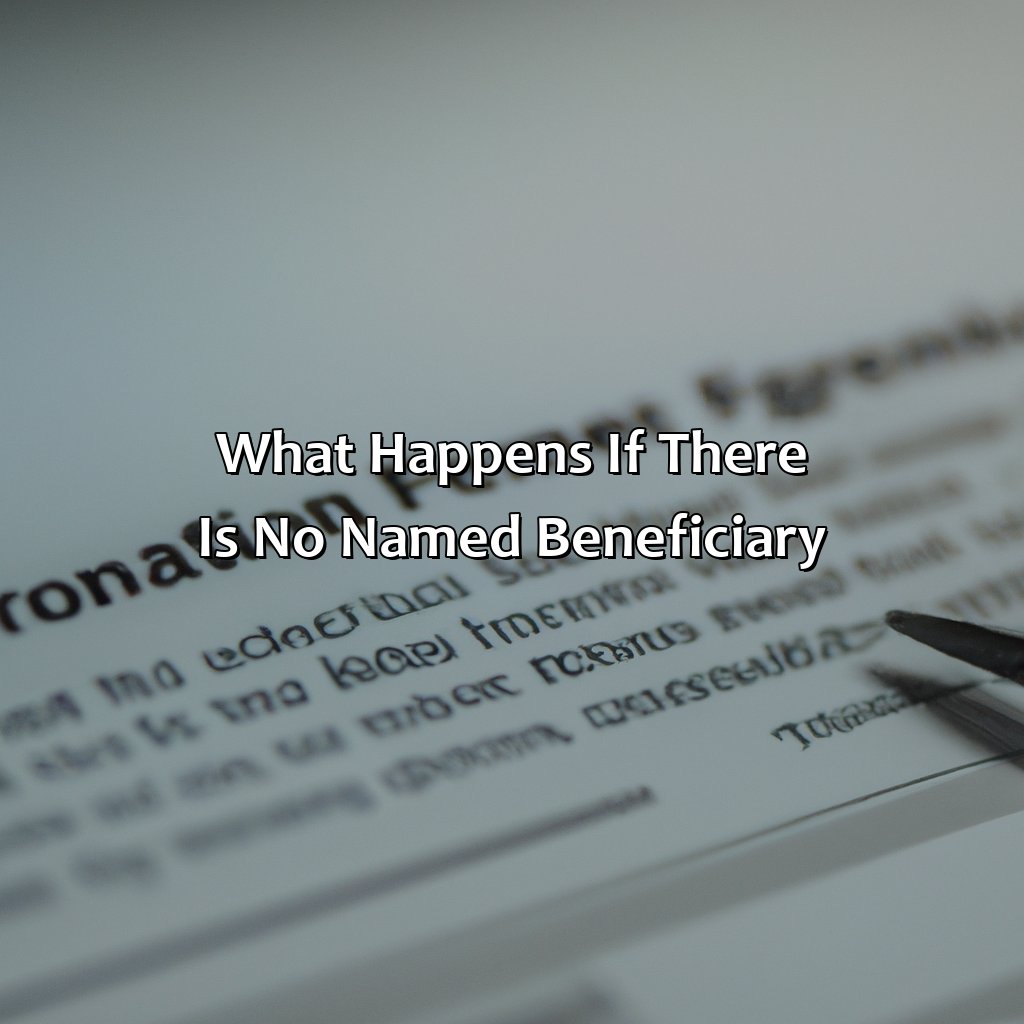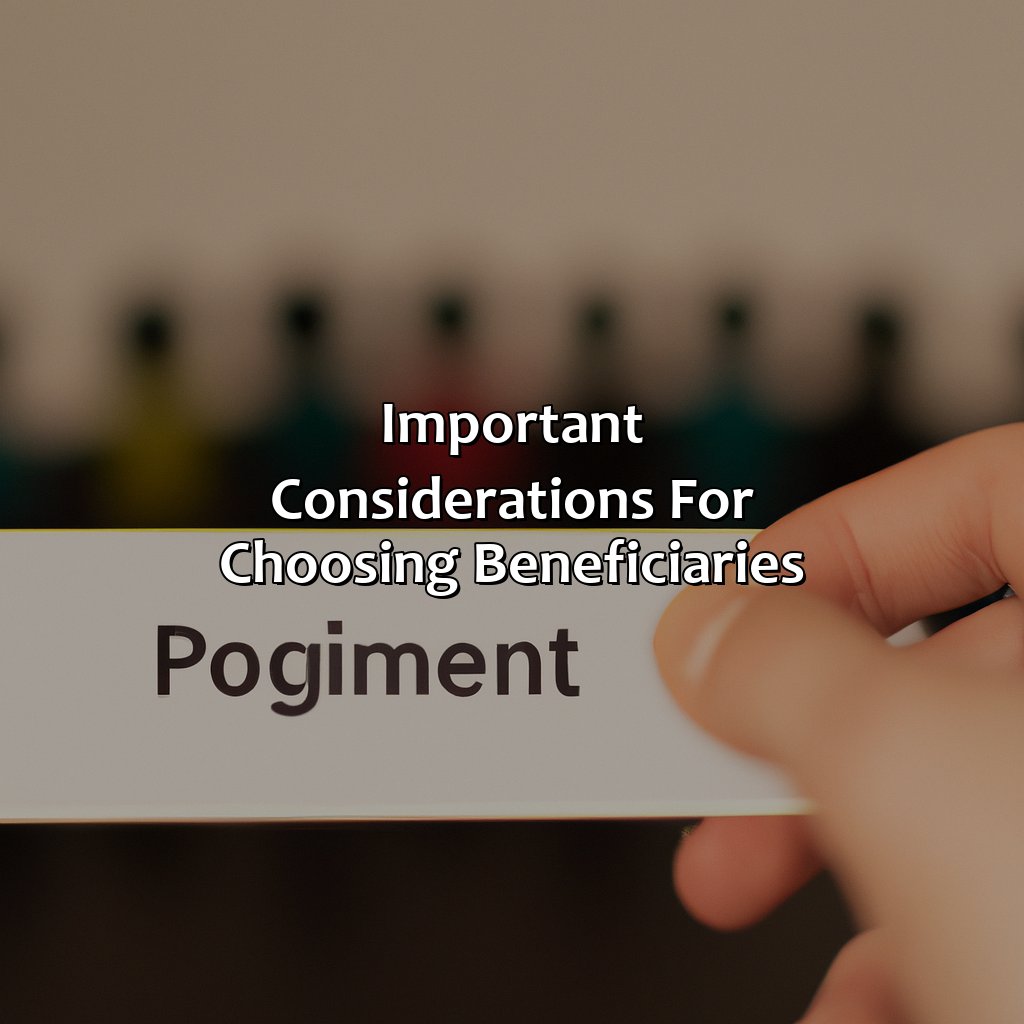Who Can Be A Beneficiary Of A Pension?
Key Takeaway:
- Spouses or partners are typically the primary beneficiaries of a pension plan. It is important to update your beneficiary designation after major life events, such as marriage or divorce, to ensure that your spouse or partner will receive the benefits.
- Children and dependents may also be beneficiaries of a pension plan, depending on the plan’s rules and regulations. It is important to clarify the definition of dependents and to update the beneficiary designation as circumstances change.
- Named individuals or entities, such as charities or trusts, may also be named as beneficiaries of a pension plan. It is important to ensure that the named beneficiaries are properly identified and that their contact information is up to date.
Are you concerned about securing a comfortable life for yourself after retirement? You can benefit from a pension plan, which helps you create a retirement fund. Learn about the types of beneficiaries you can appoint to get financial security in later life.
Pension Benefits and Beneficiaries
Pension plans provide financial security to retirees and their families, ensuring that they can maintain their standard of living after retirement. One important aspect of pension plans is the identification of beneficiaries who can receive pension benefits. Beneficiaries can include the plan participant’s spouse, children, or another individual as designated by the plan participant.
Pension benefits can take the form of annuity payments or a lump sum distribution, and the amount of benefits paid out can vary based on factors such as the age of the participant, the length of their service, and the specific plan provisions. If you are wondering how do I find my pension information, RetireGenz can help answer your questions and provide guidance for retirement planning.
It is critical for plan participants to carefully consider who they designate as beneficiaries and to periodically review and update their beneficiary designations to ensure that their pension benefits are distributed according to their wishes in the event of their passing. Pro Tip: Always review and update your beneficiary designations in accordance with changing life circumstances such as marriage, divorce, or the birth of a child.

Image credits: retiregenz.com by Adam Arnold
Who can be a Beneficiary of a Pension?
Who can get pension payouts? You may find clarity in four possible solutions:
- Spouse or Partner
- Children and Dependants
- Named Individuals
- Estate or Next-of-Kin
Each has its pros and cons, so it’s essential to plan for the future to guarantee the right beneficiary.

Image credits: retiregenz.com by Adam Jones
Spouse or Partner
When it comes to pension beneficiaries, those in a spousal or partner relationship are typically given priority. This is because they are considered to be the closest and most dependent relationships. The law may define “spouse” differently depending on the jurisdiction and specific policy. In most cases, though, anyone in a legally recognized domestic partnership or marriage is eligible for pension benefits.
In addition to spouses or partners, it’s also important to consider other potential beneficiaries when planning your pension. These may include children, siblings, parents, and others who have been financially dependent on you. When deciding how to allocate your pension benefits, it’s important to weigh the considerations of each potential beneficiary carefully. If you’re wondering who is eligible for Canada Pension Plan benefits, it’s important to research the criteria and requirements set by the government.
It’s crucial that you consult with a financial advisor or attorney before setting up your pension plan so you don’t miss out on any important details regarding eligible beneficiaries. By doing so, you can ensure that your loved ones are taken care of after you’re no longer able to do so yourself. Don’t let fear of missing out cause you to make hasty decisions when preparing for retirement – take the time to make sure everything is in order so that you can enjoy peace of mind for years down the road.
“Who needs inheritance when you can just rely on your parents’ pension? Children and dependants rejoice!”
Children and Dependants
The eligibility of a pension beneficiary depends on various factors, including their relationship with the pension holder. Those who can be classified as “dependent children” under the pension scheme are eligible to receive pensions. Dependants include spouses, cohabiting partners, and children of the pension holder.
The children of the pension holder could be biological or adopted and must not have attained the age of 18 years. If they are still in school or college education, they can receive pensions until they complete their studies or reach 23 years old. In cases of permanent disability or mental incapacity, they can continue receiving pensions even beyond their 23rd birthday.
It is important to note that some pension schemes consider children who are above 18 years as adults and therefore may not be eligible for a pension unless previously stated otherwise in the scheme policy. Find out who are not eligible for family pension to ensure you are aware of the terms and conditions.
Do not miss out on ensuring your loved ones’ financial security by providing them access to a pension scheme today! Looks like the competition for being a named individual on someone’s pension plan is heating up faster than the pension age itself.
Named Individuals
For a pension plan, individuals can be named as beneficiaries in case of death or other qualifying events. The following are important things to know about named individuals:
- They must be identified by name and relationship to the plan participant.
- The designation of a named beneficiary can override any prior designation, including default beneficiaries.
- Named beneficiaries typically receive distributions more quickly than non-named beneficiaries.
- A participant may name multiple primary and contingent beneficiaries for their pension plan.
It’s vital to keep beneficiary designations up-to-date to ensure that assets are distributed according to your wishes. Keep in mind that some plans may have specific rules regarding beneficiaries, such as spousal consent requirements.
According to a study by the National Association of Plan Advisors (NAPA), only 56% of Americans have checked their retirement account information in the last year. Just remember, your estate or next-of-kin won’t be fighting over your pension if you spend it all on avocado toast.
Estate or Next-of-Kin
In the event of a pensioner’s death, their surviving family members may be eligible to receive benefits from the pension. These beneficiaries include those listed in the Pension Plan documents, such as estate or next-of-kin. The estate represents the deceased person’s entire net worth and assets left behind after their death. Moreover, the next-of-kin is someone who is legally entitled to inherit a deceased person’s assets in case they had not made any beneficiary designation before their demise. It is important to consult with a financial advisor or lawyer to ensure that all legal documents reflect these wishes and that beneficiaries are correctly identified.
Furthermore, it is recommended that individuals update their beneficiaries regularly and choose more than one beneficiary in case of unforeseen events or situations. This reduces complications that may arise from disputes between beneficiaries or legally recognized heirs regarding distribution of retirement benefits. Additionally, providing clear instructions on how and when the benefits should be disbursed can save time and reduce uncertainty about what assets should go where. Staying on top of these details ensures that pensions serve as an effective means of supporting your hard work even after you have passed away, providing peace of mind for both yourself and your loved ones.
No named beneficiary? Looks like the pension money will end up in the Hands of Fate instead.
What Happens if there is no Named Beneficiary?
If no beneficiary is named for a pension plan, three solutions come into play:
- Intestate: This happens when the owner of the pension plan dies without naming any beneficiaries and without leaving a will, in which case the plan assets will go to the owner’s surviving spouse or closest living relatives.
- Court Decisions: When there is no beneficiary named and conflicting claims are made for the plan assets, a court may decide who gets the money.
- Unclaimed Benefits: If the plan administrator cannot locate any beneficiaries and no claims are made on the plan assets, the benefits may remain unclaimed.
These subsections explain what happens if the owner has not indicated a recipient and how it is settled.

Image credits: retiregenz.com by Adam Jones
Intestate
When a person dies without leaving behind a will or any instruction regarding their pension, it is referred to as dying intestate. In such cases, the pension fund is distributed amongst the beneficiaries according to the laws of intestacy. Typically, the distribution depends on the deceased’s marital status and whether they have children or not.
If the deceased was married or in a civil partnership, their spouse would receive the pension unless there are dependent children to consider. If the deceased has children but no spouse, the pension would be divided equally amongst them. If there are neither marriages nor children involved, the deceased’s parents will receive the pension if they are still alive; otherwise, it passes down to siblings and ancestries.
In situations where there is no named beneficiary for a pension account through which retirement benefits are paid out after an employee retires or dies, probate court steps in to distribute assets based on state law. The court identifies an appropriate party to act as beneficiary and distribute funds under certain rules established by applicable law.
Pro Tip: It is always wise to update your nominations regularly so that your inheritors can claim their rightful share in case of something unforeseen happens.
Looks like the court’s decision on who gets the pension will be a real case of winner takes it all, or in this case, loser loses it all.
Court Decisions
When a named beneficiary is not present, the distribution of pension benefits becomes complicated. Court decisions on this matter have determined that the plan administrator must follow specific procedures to identify potential beneficiaries, including surviving spouses and dependents.
In such cases, the court may appoint a beneficiary based on relevant circumstances. For example, if a participant had named their spouse as the primary beneficiary but they subsequently divorced and remarried without changing their designation, the court might award the benefit to the former spouse in line with equitable distribution policies.
It is important to note that court decisions can vary depending on state laws, so it is best to seek legal advice from an experienced attorney who specializes in managing pension funds and estates.
In one similar case in New York State, a man’s pension plan had no designated beneficiary. The court found his sister to be most fitting due to her history of caring for him during his illness. However, even in such cases, legal disputes can arise between potential beneficiaries.
If you don’t claim your pension benefits, the only person benefiting is the Grim Reaper.
Unclaimed Benefits
Inheritance of Unclaimed Retirement Benefits
When a retirement account holder dies without naming a beneficiary or the named beneficiary is not alive, it becomes an unclaimed retirement benefit. Some of the commonly found consequences that take place when someone doesn’t claim their benefits are:
- Legal uncertainty for potential heirs to the unclaimed funds.
- Difficulty in locating potential heirs.
- To avoid the money being lost forever to beneficiaries who are unknown or overlooked.
- The funds can end up transferring over to the state government, escheatment,s particularly if no one claims the benefits after several years.
- Unwarranted taxes and penalties on the unclaimed amount
To recover a lost benefit, specific legal proceedings must occur. However, in some cases where no one steps forward to claim the benefit, this sum ultimately reverts to both federal and state governments. To understand more about pension exclusion and how it works, consult a retirement planning expert.
It is essential to know all these details before investing in a retirement plan. Always ensure you name at least two beneficiaries in case one of them is unable or unwilling to inherit it. According to Statista, IRAs owned $11.4 trillion as of 2021.
One must be very vigilant while investing and securing their hard-earned money invested into a pension. Choosing a beneficiary is like picking a prom date – it’s important to choose wisely and for the long haul.
Important Considerations for Choosing Beneficiaries
Weigh up your personal circumstances, tax implications and legal requirements when deciding who should get your pension benefits. This can guarantee that your beneficiaries get the most out of your pension. It’ll also ensure that your wishes are met.

Image credits: retiregenz.com by Harry Washington
Personal Circumstances
When choosing beneficiaries for a pension, considering one’s individual circumstances is vital. This includes factors such as age, health status, marital status, and financial situation. It is crucial to assess whether the chosen beneficiary will be able to manage their finances responsibly and efficiently.
Moreover, if the intended recipient has any special needs or disabilities, it may also be essential to involve professionals such as lawyers or financial advisors to ensure that the chosen beneficiary receives the necessary support.
Additionally, it is advisable to review and update beneficiaries regularly to reflect any changes in personal circumstances such as divorce, remarriage, or new dependents. Failing to do so can lead to unintended consequences and disputes. Learn about the number of pension plans available in the US.
It is important to note that pensions are regulated by government agencies such as the Pension Benefit Guaranty Corporation (PBGC) in the United States. According to PBGC data, 44 million workers participate in 26 thousand private sector defined benefit pension plans in the US alone.
Death may be inevitable, but taxes are too – make sure you consider the tax implications of your beneficiary choices.
Tax Implications
Considering the Tax Implications of choosing beneficiaries is vital when planning your pension. A beneficiary’s tax status, relationship with the deceased, and pension scheme type can all impact tax liabilities. Spouses or dependents receiving death benefits are usually tax-free but if left to a non-spouse or estate beneficiary, this may result in tax deductions.
Furthermore, pensions are subject to Inheritance Tax (IHT) which individuals need to consider when choosing beneficiaries. IHT is a complex process and can be substantial depending on the pension fund size, estate value, and other assets. If you want to know which of the following IRAs provides a pension for employees, you can consult with a financial advisor.
It’s essential to keep an eye on updates from HM Revenue & Customs (HMRC) as these policies can change frequently. These factors should be considered in detail while selecting beneficiaries for your pension.
In a study undertaken by The Association of British Insurers (ABI), 77% of people said making financial provision for loved ones after they die was very important; highlighting the importance of considering tax implications when selecting beneficiaries.
Why settle for just breaking hearts when you can break the law? Let’s talk legal requirements for choosing beneficiaries.
Legal Requirements
Choosing beneficiaries for a pension is bound to legal requirements that must be considered when making the decision. These rules limit the choices available for those who are allowed to benefit, requiring various documentation procedures and adhering to stipulated guidelines provided by regulatory authorities.
One important aspect of these legal requirements is considering who can be named as a beneficiary. Individuals that meet certain age criteria, are state-recognized dependents, or have a shared financial interest may be named as beneficiaries. However, individuals with criminal backgrounds and other associated risks may not qualify for disability pension.
It’s worth noting that if you want to understand how does a pension fund work, special considerations apply in certain circumstances such as naming secondary or tertiary beneficiaries in case of primary ones being unavailable. Special rules also apply for those undergoing divorce proceedings or in situations where establishing valid heirs becomes an issue.
In the past, there have been records of controversies regarding unqualified beneficiaries receiving pensions through questionable means. A well-known example is the case of Anna Nicole Smith; her disputed claim as a beneficiary of her deceased husband’s pension caused substantial legal battles between herself and his other surviving family members. These occurrences further emphasize the importance of being meticulous while selecting pension beneficiaries and abiding by all stipulated regulations to avoid any possibilities for conflicts arising later on. To learn about what percentage of the stock market is owned by pension funds, visit our website.
Some Facts About Who Can Be a Beneficiary of a Pension:
- ✅ A beneficiary of a pension can be a spouse, child, or dependent of the pension holder. (Source: Investopedia)
- ✅ In some cases, an ex-spouse may be entitled to a portion of the pension as a beneficiary. (Source: Forbes)
- ✅ Some pensions also allow for non-family members to be named as beneficiaries. (Source: The Balance)
- ✅ It is important to regularly review and update beneficiary designations to ensure they are accurate and reflect current wishes. (Source: NerdWallet)
- ✅ If no beneficiary is named, the pension may pass to the estate of the deceased pension holder. (Source: Pension Rights Center)
FAQs about Who Can Be A Beneficiary Of A Pension?
Who can be a beneficiary of a pension?
Any individual who has been designated by the pension plan participant as a recipient of pension benefits following the participant’s death may be a beneficiary of a pension. Most commonly, beneficiaries are spouses, children, or other family members who were financially dependent on the participant.
Can a non-family member be a beneficiary of a pension?
Yes, a pension plan participant may designate any individual or organization as a beneficiary, regardless of their familial relationship. This could include friends, charities, or other entities that the participant wishes to support after their death.
Can a beneficiary of a pension be changed?
Yes, a pension plan participant may change their designated beneficiary at any time, for any reason. However, it is important to note that some pension plans have specific requirements for changing beneficiaries, such as written consent from the existing beneficiary or approval from the plan administrator.
What happens if a pension plan participant does not designate a beneficiary?
If a pension plan participant does not designate a beneficiary, the plan’s default provisions will typically determine who receives any remaining benefits. This could include the participant’s surviving spouse, children, or next of kin.
Can multiple beneficiaries share a pension benefit?
Yes, a pension plan participant may designate multiple beneficiaries to share in their pension benefit. The participant may specify the percentage of the benefit that each beneficiary should receive, or they may divide it equally among all beneficiaries.
Are pension benefits subject to taxation for beneficiaries?
Yes, pension benefits received by beneficiaries are generally subject to federal income tax. However, the tax treatment of pension benefits for beneficiaries may vary depending on factors such as the beneficiary’s age and the type of pension plan. Consult a tax professional for specific guidance.
